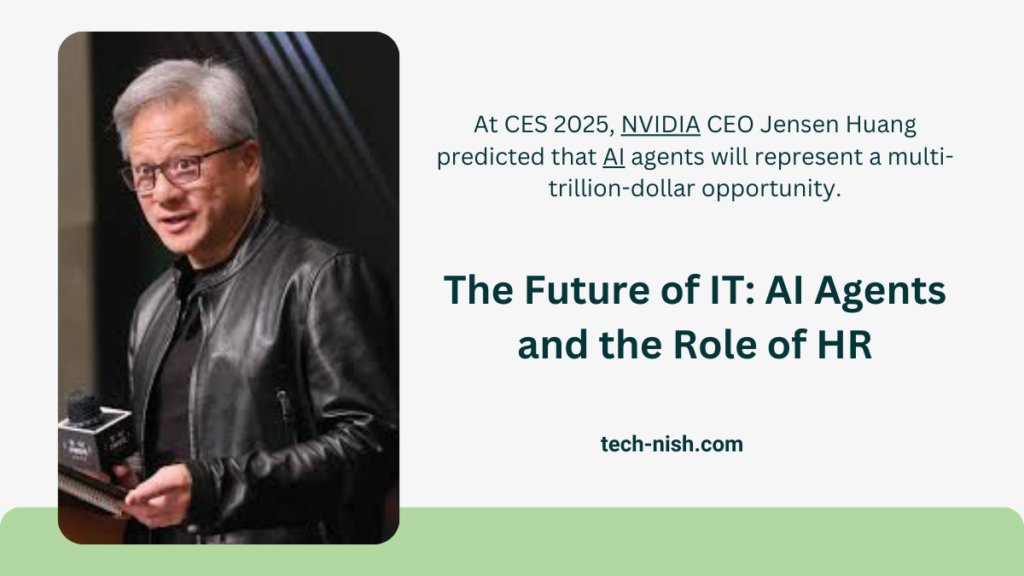The Future of IT: AI Agents and the Role of HR
The integration of artificial intelligence (AI) into the field of information technology (IT) is reshaping industries at an unprecedented pace. As AI agents become more sophisticated, their influence on IT operations, cybersecurity, and customer support grows. Simultaneously, the role of human resources (HR) is evolving to meet the demands of this AI-driven world. This article explores the transformative impact of AI on IT and the crucial responsibilities HR holds in navigating these changes.
Table of Contents
AI Agents in IT
1. Automation of Routine Tasks AI agents are revolutionizing the IT landscape by automating repetitive and time-consuming tasks. Routine activities such as data entry, system monitoring, and basic troubleshooting can now be efficiently handled by AI systems. This automation not only enhances productivity but also allows IT professionals to focus on more strategic and complex projects.
2. Enhanced Decision-Making AI agents offer advanced data analytics and predictive insights, significantly improving decision-making processes in IT departments. By analyzing vast amounts of data, AI can identify patterns and trends that might be overlooked by human analysts, enabling more informed and effective decisions.
3. Cybersecurity In the realm of cybersecurity, AI agents are indispensable. They excel at detecting threats faster and more accurately than traditional methods. AI systems can monitor network activity in real-time, identifying anomalies and implementing automated responses to neutralize potential threats, thus enhancing the security posture of organizations.
4. Development and Maintenance AI assists in software development by generating code, identifying bugs, and optimizing performance. These capabilities accelerate the development lifecycle, reduce errors, and improve the overall quality of software products. This shift allows developers to concentrate on innovative solutions and creative problem-solving.
5. User Support AI-powered chatbots and virtual assistants are transforming customer support in IT. These AI agents handle a wide range of user queries, providing instant assistance and reducing response times. Their availability around the clock ensures that users receive continuous support, improving customer satisfaction.
The Evolving Role of HR
1. Reskilling and Upskilling As AI takes over routine tasks, HR’s role in reskilling and upskilling the workforce becomes critical. HR must implement training programs to equip employees with the skills needed to work alongside AI technologies and take on new, more complex roles.
2. Talent Acquisition The demand for AI and machine learning experts is surging. HR must refine its hiring strategies to attract talent proficient in these advanced technologies. This includes creating attractive job roles, offering competitive benefits, and fostering a culture of innovation.
3. Ethical AI Deployment HR has a significant role in ensuring the ethical use of AI within the organization. This includes adhering to privacy standards, preventing bias in AI systems, and ensuring fair treatment of employees whose roles may be affected by AI integration.
4. Employee Engagement and Support As AI changes the nature of work, maintaining employee engagement becomes a priority for HR. Developing strategies to support employees during transitions and creating a positive work environment are essential to ensure that the workforce remains motivated and productive.
5. Change Management HR leads change management initiatives to help employees adapt to new technologies and processes introduced by AI. Effective communication, training, and support systems are key to managing the cultural shift within the organization.
Recent Insights from NVIDIA’s CEO and Other Industry Leaders
At CES 2025, NVIDIA CEO Jensen Huang predicted that AI agents will represent a multi-trillion-dollar opportunity, fundamentally changing how businesses operate by automating tasks traditionally done by humans. He foresaw IT departments transforming into HR departments for AI agents, managing their integration into various corporate functions. This vision suggests a significant shift where AI agents could handle roles from governance to customer service, potentially impacting white-collar jobs across industries. Discussions online have highlighted this as part of a broader movement towards AI integration, with NVIDIA positioning itself as a leader in this technological shift. Additionally, Sam Altman from OpenAI predicted that AI workers might join the workforce in 2025, indicating an imminent change in the job market due to AI advancements.
Conclusion
The future of IT is being shaped by the rapid adoption of AI agents, leading to significant transformations in operations, cybersecurity, development, and customer support. Concurrently, HR’s role is expanding to address the challenges and opportunities brought by these changes. By focusing on reskilling, ethical deployment, and change management, HR can ensure that organizations and their employees thrive in the AI-driven era. Together, AI and HR will redefine the future of work in IT, paving the way for innovation and growth.

